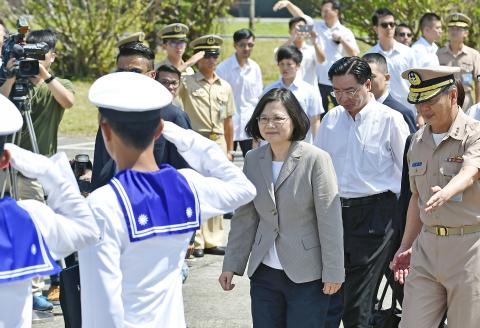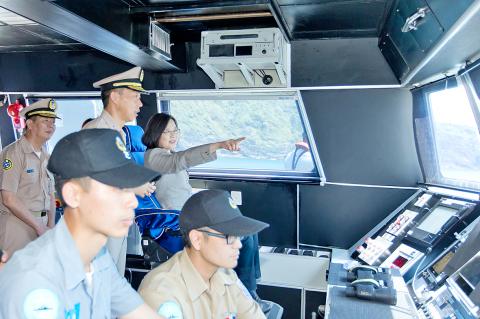President Tsai Ing-wen (蔡英文) yesterday reiterated her administration’s determination to push for a self-reliant national defense force as she spoke on board a domestically built warship off Yilan.
Following an inspection tour of air bases in Hualien on Sunday last week — the first time in her capacity as commander-in-chief of the nation’s armed forces — Tsai visited a naval base in Yilan County’s Suao Township (蘇澳) and boarded the Tuo Jiang, the nation’s first locally built stealth missile corvette that was commissioned in March last year.
She said that the nation would continue to promote a policy of building its own vessels.

Photo: SAM YEH, AFP
“In addition to enhancing naval combat capacity, it will also help the development of the shipbuilding and machinery sectors, as well as system integration,” Tsai said.
The government’s approach would be to make “demands for national defense the driving force of industrial upgrade and transformation,” Tsai said.
However, the government is bound to encounter numerous challenges in the pursuit of a self-reliant national defense force she said.

Photo courtesy of the Military News Agency
“The path is not an easy one, but there is no return,” she told officers and cadets aboard the Tuo Jiang.
She said the nation has used superior technology in the building of the Tuo Jiang and “more importantly, we have the determination to succeed.”
Tsai, accompanied by Minister of National Defense Feng Shih-kuan (馮世寬), Chief of General Staff Yen De-fa (嚴德發) and National Security Council Secretary-General Joseph Wu (吳釗燮), said it was her first time on board the Tuo Jiang, and when the vessel sailed out of Suao, she said she “was deeply touched” to see the powerful naval vessel and the beautiful Yilan coast.
Tsai said that hoisting the flag of the commander-in-chief on the ship was an honor and responsibility.
“I am privileged to be able to safeguard our homeland and marine lifeline with all of you in the navy,” she said.
Tsai also said the Tuo Jiang is a symbol of David fighting Goliath.
On Sept. 2, 1958, in one of the major sea battles in the Taiwan Strait, a naval vessel named the Tuo Jiang was shelled by Chinese ships and 11 of its 81 crew were killed, including medical officer Chen Ke-jung (陳科榮), who continued to tend to the wounded, despite his injuries, and later died of blood loss.
Tsai also said that Taiwan is surrounded by the sea, which she described as the nation’s gateway to the world, and she encouraged everyone to learn how to protect the nation’s sea lanes.
The Tuo Jiang, with Tsai and her entourage on board, made a short cruise that lasted 25 minutes.
Tsai later inspected an army base and dined with the personnel of an infantry brigade.
She said that while the base had been freshly painted, what is more important is whether the quality of equipment is good enough.
“Just painting and mowing the lawn [in anticipation of an inspection] will not make the military better,” she said, adding that the government would continue to push for national defense reforms.
A good combat force needs a good system, high efficiency and good morale, she said.
Tsai has inspected the air force, army and navy since taking office on May 20 in a show of balanced attention to the three forces.

INVESTIGATION: The case is the latest instance of a DPP figure being implicated in an espionage network accused of allegedly leaking information to Chinese intelligence Democratic Progressive Party (DPP) member Ho Jen-chieh (何仁傑) was detained and held incommunicado yesterday on suspicion of spying for China during his tenure as assistant to then-minister of foreign affairs Joseph Wu (吳釗燮). The Taipei District Prosecutors’ Office said Ho was implicated during its investigation into alleged spying activities by former Presidential Office consultant Wu Shang-yu (吳尚雨). Prosecutors said there is reason to believe Ho breached the National Security Act (國家安全法) by leaking classified Ministry of Foreign Affairs information to Chinese intelligence. Following interrogation, prosecutors petitioned the Taipei District Court to detain Ho, citing concerns over potential collusion or tampering of evidence. The

NEGOTIATIONS: The US response to the countermeasures and plans Taiwan presented has been positive, including boosting procurement and investment, the president said Taiwan is included in the first group for trade negotiations with the US, President William Lai (賴清德) said yesterday, as he seeks to shield Taiwanese exporters from a 32 percent tariff. In Washington, US Trade Representative Jamieson Greer said in an interview on Fox News on Thursday that he would speak to his Taiwanese and Israeli counterparts yesterday about tariffs after holding a long discussion with the Vietnamese earlier. US President Donald Trump on Wednesday postponed punishing levies on multiple trade partners, including Taiwan, for three months after trillions of US dollars were wiped off global markets. He has maintained a 10 percent

TRADE: The premier pledged safeguards on ‘Made in Taiwan’ labeling, anti-dumping measures and stricter export controls to strengthen its position in trade talks Products labeled “made in Taiwan” must be genuinely made in Taiwan, Premier Cho Jung-tai (卓榮泰) said yesterday, vowing to enforce strict safeguards against “origin laundering” and initiate anti-dumping investigations to prevent China dumping its products in Taiwan. Cho made the remarks in a discussion session with representatives from industries in Kaohsiung. In response to the US government’s recent announcement of “reciprocal” tariffs on its trading partners, President William Lai (賴清德) and Cho last week began a series of consultations with industry leaders nationwide to gather feedback and address concerns. Taiwanese and US officials held a videoconference on Friday evening to discuss the

PERSONAL DATA: The implicated KMT members allegedly compiled their petitions by copying names from party lists without the consent of the people concerned Judicial authorities searched six locations yesterday and questioned six people, including one elderly Chinese Nationalist Party (KMT) member and five KMT Youth League associates, about alleged signature forgery and fraud relating to their recall efforts against two Democratic Progressive Party (DPP) legislators. After launching a probe into alleged signature forgery and related fraud in the KMT’s recall effort, prosecutors received a number of complaints, including about one petition that had 1,748 signatures of voters whose family members said they had already passed away, and also voters who said they did not approve the use of their name, Taipei Deputy Chief Prosecutor